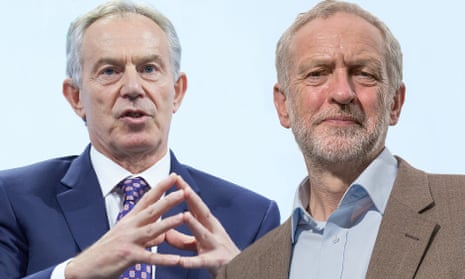So Tony Blair is puzzled about the rise of Jeremy Sanders and Bernie Corbyn as fiery leftwing candidates for high office. Excellent. The former centre-left prime minister isn’t puzzled enough, in my experience. Puzzlement might do him good; even prompt him to wonder if his own behaviour since leaving office has contributed in any way to voter disenchantment.
I say this more in hope than expectation, more in sorrow than in anger, as an admirer of Blair. A skilled and successful leader of a Britain more prosperous and content than now for a decade, he would not have got us into several of the troubles the country currently faces – in Europe and Scotland for example, though he managed one or two of his own.
But I never felt he stood back far enough to see the bigger picture. On a trip once I gave him a history book in the shaky belief that, if he ever bothered to open it, he might learn something. Fat chance. I can’t remember how often I’ve joked that Gordon Brown read books but Blair used them to keep the door open.
In his interview with the Guardian and FT he seems to acknowledge that many Labour and Democrat activists have faced frustrating economic times, job losses, stagnant pay, rising debt and faltering services. They are burdened with student debt, the jobs market looks spottier than it was when their parents were young and the chances of owning their own home currently look remote in many places.
Worse in some ways, they have grown up in some comfort and with high expectations, both comfort and expectations higher than in previous generations which may have got lucky but generally started from a much lower base: no foreign holidays, CDs or convenience food, less stuff and far less choice.
To cap all that, they see a class of super-rich racing ahead with all the swag in ways not seen for a century at least. As Jonathan Freedland points out, Sanders tells this story with eloquent gusto (not a Corbyn strong suit) and gets a huge gut response from audiences.
Warren Buffett, the self-made, super-rich investment sage of Omaha, Nebraska, says it too in sorrow. “There is a class war. It is being waged by my class, the rich, and we are winning.” Buffett (“I gave my children enough money to do anything, but not enough to do nothing”) is giving most of his fortune to Bill and Melinda Gates’s foundation to spend on real need.
That’s an answer of sorts but not a good enough one. There has to be a political and economic answer to the great challenge of rising inequality around the world, in China and New Zealand almost as much as in the US or UK.
This is where Blair’s puzzlement kicks in. He doesn’t really get it. He thinks about Corbyn and Sanders in terms of their electability. He’s right but he’s also wrong. I agree that Middle America is unlikely to elect either of the two angry, old, white men currently on offer as president, the austere but principled Sanders or the charlatan Donald Trump. Ditto the bearded, inner-city leftwinger from Islington.
Vermont, where Sanders hails from (I met him there when he was mayor of Burlington in the 80s), is as typical of the US as Islington is of Britain. Most people here and there live neither in high-density inner cities or in low-density rusticity. Most voters live in smaller towns or the suburbs.
But activists who have put up with the compromises of Blairism and of his pals Bill and Hillary Clinton feel disappointed, cheated even. I resist YouGov analyst Freddie Sayers’s insistence that the poor are now behind Bernie, as distinct from the public-sector middle class and idealistic young.
But they are cross enough not to mind if their candidate doesn’t win. Those young enough not to have seen this movie before even think he might; they have not witnessed Michael Foot or Neil Kinnock falter, not seen George McGovern or Gene McCarthy lose the White House. They’re like Peter Finch, the disillusioned TV anchor in Network, who tells his viewers to open the window and shout: “I’m mad as hell and I’m not going to take it any more.”
Network is 40 years old and a lot of people are a lot madder now. They want to frighten the elites who have failed them and are yet to come up with viable solutions. So they vote for candidates who haven’t done so either but at least articulate their frustrations from the streets of Athens or Paris to sleepy Burlington, Vermont.
How can Blair possibly understand that? Hasn’t he spent the last eight years of semi-retirement becoming one of the semi-elite, albeit it at the cut-price bargain basement end? Yes. I am happy to accept that he has put a lot of it into good causes – half on some accounts – but it’s all too opaque and looks greedy. So instead of making himself part of the solution, he’s now 62 and part of the problem.
The book I gave him on that trip was Rubicon, Tom Holland’s rip-roaring history of the transformative years when the Roman republic slipped into world empire and imperial autocracy while retaining the outward forms of republican government. It’s an eternal story: states and empires rise and fall; they wither and reinvent themselves if they are lucky.
We stand in great danger – economic, political, military – Tony. Try harder. You could start by digging out Rubicon and reading a few pages. With its fake Roman architecture, its paralysed politics and lurking demagogues, Washington DC is the ideal place to start.

